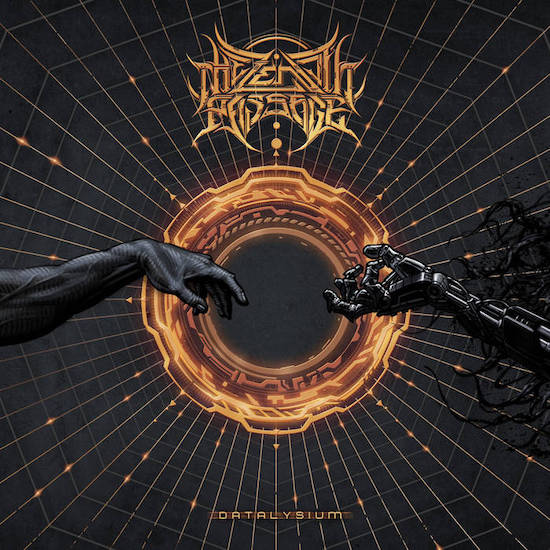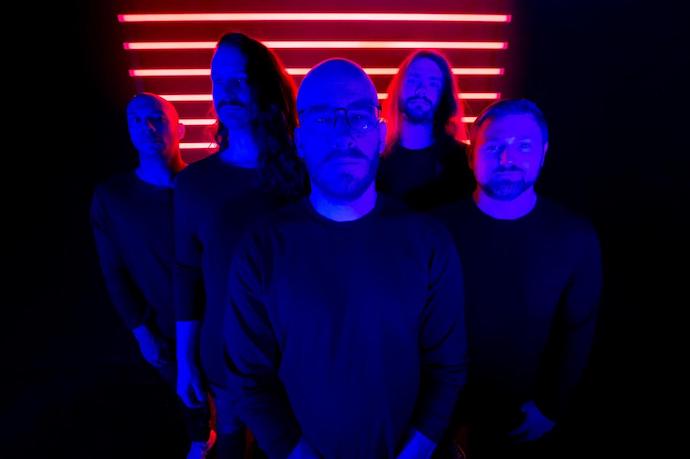
(Here’s DGR‘s review of the new second album by L.A.-based The Zenith Passage, recently released by Metal Blade Records.)
A few specters are hovering around tech-death group The Zenith Passage and their newest release Datalysium. One of them is the surprising amount of time that it took for The Zenith Passage to reach their sophomore full-length release. In what seems to be a recurring theme with 2023, a large block of time has passed between releases here; the group’s prior album Solipsist arrived in 2016 and it is only now at a little over seven years later that the band are on their second album.
The second specter is something that everyone is going to bring up at one point or another when discussing them. Given the group’s pedigree, it is hard not to imagine this playing out as one of the background narratives surrounding the record: When three of the four musicians involved in a new release were at one point or another involved in the revolving door of The Faceless over the years, it’s difficult to avoid drawing comparisons.

Photo by Stephanie Cabral
Which is wild, given that although the combination of tech-death group plus vocalist Derek Rydquist‘s monstrous growls is always going to bring up shades of the early-aughts tech-death explosion, The Faceless aren’t the only band we’d point to in discussing Datalysium.
The Zenith Passage were already charting an interesting ‘dreamlike’ path for themselves with Solipsist, one that would often bear resemblance to a keyboard-heavy version of the type of relentless pummeling that you’d expect out of Soreption – a band for whom guitarist Justin MicKinney would eventually go on to handle live duties over a couple of years.
Datalysium starts from an interesting point, then, not so much just grabbing the relay baton from where Solipsist had handed it over all those years ago, but reflecting a complete reconstruction of the band as a whole into a sort of hybrid monster that is not just the combined ambitions of where The Zenith Passage had been traveling previously, but also so much of the previously mentioned other groups that Datalysium seems to leap past descriptive corporeal form straight into musical all-seeing orb.
With that long and rambling path of an introduction laid before us then, it will probably not come as a shock to read that one of the most interesting aspects of Datalysium isn’t the amount of surprise within its nine-song tracklisting, but rather how ‘expected’ the album is, and how good the band are at fulfilling a lot of lofty expectations.
If anyone had imagined a group that was going to re-unite a block of previous The Faceless musicians and mash that together with The Zenith Passage‘s own keyboard-laden brutality by way of Soreption groove, Datalysium would be the album we probably would have expected to come from it. It’s a tech-death fantasy draft made into album form – much like artist Nader Sadek gets to do with the brutal death scene – and the united dream team here makes an album that is equal parts spiritual successor to where they exited out of The Faceless but also still recognizably The Zenith Passage‘s own blueprint.
There even seems to be an equal spread of keyboard across Datalysium as its older sibling Solipsist had before it. It’s tempting then to risk all sense of imaginability here and describe Datalysium as being the form Solipsist would’ve taken post-emergence from cocoon. Datalysium is not bereft of its own ideas, as there are indeed surprises in how The Zenith Passage approach their music here, but on that same pathway, if you wanted to look at Datalysium as one of those ur-tech death albums that seem to absorb an entire genre into one flashpoint, you’d be perfectly valid in doing so.
One of the more interesting aspects of the album is how the guitar sounds, with a surprisingly dry approach that isn’t as bathed in distortion as some people might be used to. It’s a very tactile sort of sound, wherein a listener can almost hear every pluck and pick-scrape across the strings.
It’s not the only tone used throughout the disc, as the standard classic ‘big-chug’ one might expect is still more than happy to burly-brawl its way into the soundscape. But the overwhelming first impression for a listener may not be so much the humongous nature of the guitars on Datalysium but something more akin to how early single – and early-in-the-album song — “Algorithmic Salvation” sounds like a swarm of angry hornets.
While we’re on the subject of how albums seem to be passing the baton to one another, “Algorithmic Salvation” is also like it inherited the legacy of the groove that defined “Deus Deceptor” way back in 2016 and decided to run with it. Combined with the opening assault of “The Axiom Of Error”, the first two songs on Datalysium are like being welcomed back to a long-lost musical home. There’s plenty of tech-death history running through the musicians gathered here, and boy, you can hear it through every strain of this album. About the only thing that gets backburnered is the terrifying dissonance that defined vocalist Derek Rydquist‘s contributions in John Frum‘s A Stirring In The Noos album.
The way Datalysium is laid out doesn’t leave much to chance either, with the first grouping of songs perfectly content to be the big block of mind-bending singles that are one exercise in frenetic pyrotechnics after another. In a way, they’re the breadwinners of the disc and the ones which assure you that, yes, The Zenith Passage are still firmly entrenched in their chosen genre.
Two of the earliest releases from Datalysium are within that grouping, so even if you’re coming to this album late, you can recognize how they might’ve been the best choices for a first impression of this album. Datalysium‘s adventurous side becomes more prominent right about the time you segue into “Deletion Cult”. Songs stretch a little long, you get the two-part suite of “Divinertia” – one of which includes some of the heftiest weight-throwing Datalysium has available to it – and then if you’re a numbers nerd, the twin pairing of “Automated Twilight” and the title song both punching in at just a hair over seven minutes.
This is the chunk of the album where The Zenith Passage really flex and stretch their musical muscles. None of the songs are particularly ‘slow’ either; when you see a seven-minute runtime like the last two songs have, it’s because the band have jam-packed the song with all sorts of angular monstrosities and weird head-turns outside of the endless firecracker that is the drumming attack. Even as the last song wraps up it’s hard at first to tie your head around the idea that the band were able to keep all of that in a relatively tightly-packed forty-five minutes.
Datalysium is frighteningly good at what it sets out to do. This is one of those releases that is so clearly focused on its singular objective that it barely breathes and it is already checking elements off of the list. The musicianship on display here is at a stunning level, and musically every song is worthy of a deep dive of its own.
If you’ve been following the tech-death scene for a while, Datalysium will certainly have a lot of familiarity to it, but by that token the blueprint that The Zenith Passage are drawing from is one that, when executed ‘well’, is enough to leave a listener’s head spinning. The Zenith Passage execute upon that blueprint quite ‘well’ throughout Datalysium, playing to its various members’ strengths, and rather than shying away from the multitude of specters and influences that have colored the band’s history, embracing them to create one final amorphous form.
The otherworldly electronic hellscape by way of tech-death portrayed here is interesting, and a worthy successor to the already nightmarish musical world of its elder album sibling. Datalysium was created with surgical precision and will leave many a fan of the tech-death spectacle very happy.
https://www.metalblade.com/thezenithpassage/
https://zenithpassage.bandcamp.com/album/datalysium
http://www.facebook.com/TheZenithPassage

I don’t really listen to tech death and I tried hard to not like this. I failed miserably.